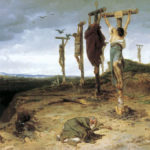Fourteenth Sunday in Ordinary Time – Year A
This time I decided to focus on the Second Reading, if only because I wanted to explore an angle, a way of seeing it, which isn’t usually taken into consideration by today’s homilists. I’ll start slightly earlier; from the Letter to the Romans, chapter 8. My passage goes from verse 5 to the verses 8 and 9 which are read in churches on this occasion:
For those who live according to the flesh are concerned with the things of the flesh, but those who live according to the spirit with the things of the spirit.
The concern of the flesh is death, but the concern of the spirit is life and peace.
For the concern of the flesh is hostility toward God; it does not submit to the law of God, nor can it;
and those who are in the flesh cannot please God.
But you are not in the flesh; on the contrary, you are in the spirit, if only the Spirit of God dwells in you. Whoever does not have the Spirit of Christ does not belong to him.
Here we can find the contrast between the flesh and the Spirit which is used often in Scripture, and is especially typical of St. Paul.
Luckily (…) we have already extensively addressed the sensible topic of the value of the body within the Christian perspective: there’s no Manichean dualism here, hence no possibility of confusion. For us Christians the body has value in itself, it’s even called the Temple of God, it receives Jesus Christ in the Eucharist.
So when you see the flesh being mentioned, it’s not trivially referring to the bodily dimension, we know that by now.
Crossroads.
Living according to the Spirit means welcoming the Holy Spirit, following Jesus, having a clear perspective of what the objectives to strive for should be: towards the Communion of Saints, desiring to be united with God, seeking perfection and a true, pure, disinterested love.
It doesn’t take a genius to guess that living according to the flesh means the exact opposite: remaining entangled in our transient, fallen, imperfect nature, enslaved by sin. Chasing unsatisfactory desires to fill an inner void, which is impossible to fill through material possessions or anything the world values.
Descending towards our animal side, our basic instincts; becoming prisoners of illusions and deceptions. Wasting, abusing, dividing, hating, spreading chaos.
In a moment I’ll get to the angle that preachers usually don’t want to discuss, as if they were afraid of touching the proverbial third rail.
Are carnal desires involved? Sex? Is this what we’re talking about here?
Let’s see…
I could almost hear the typical comments of ignorant people who pepper social media with random talking points, exuding rage and contempt: here here! The Sexophobic Catholic Church! An organization bent on ruining lives, repressing natural feelings and criminalizing pleasure!

No, it doesn’t really work like that.
We hear this from Galatians 5, 19-22:
Now the works of the flesh are obvious: immorality, impurity, licentiousness,
idolatry, sorcery, hatreds, rivalry, jealousy, outbursts of fury, acts of selfishness, dissensions, factions,
occasions of envy, drinking bouts, orgies, and the like. I warn you, as I warned you before, that those who do such things will not inherit the kingdom of God.
In contrast, the fruit of the Spirit is love, joy, peace, patience, kindness, generosity, faithfulness,
gentleness, self-control
Here we clearly see a contrast between flesh and spirit that goes far beyond any simplistic prejudice, and points to the sincerity of the choices of the heart.
Doing evil includes anything that takes us away from God’s love.
There’s more: so many ways to get lost…
However, the list of the works of the flesh is suitably confused, if I may say so. As if created by association of ideas, on the inspiration of the moment.
Realistically, you cannot really expect to be able to compile an exhaustive list; each one of us must learn how to properly judge the nature of our actions.
But these examples are still helpful, to give us some points of reference.
In the list we find various items that seem suitable for the occasion, considering the concerns of a pastor of the nascent Church: hatred, discord, jealousy, dissensions, divisions, factions, envy occasions… These are all avenues for sowing division in the community, vices that need to be stamped out in the bud.
Then there’s also a separate chapter dealing with what distances a person from God in a more direct way: through magic or idols.
The rest refers to something more predictable, speaking of works of the flesh.
Drunkenness is already about letting it go, seeking cheap pleasures, throwing yourself away; I see, however, that the subsequent “orgies“, which would seem to leave no doubt, many Protestant translations renders as “partying”, which honestly seems to me excessively euphemistic (even to the point of criminalizing the very idea of celebrating together, potentially). Others translate it “revellings” or even “carousing” (with some more emphasis, in this case, on getting drunk): at any rate, we’re still talking about group events, in which one indulges in unbridled pleasure-seeking.
The bottom of the list has a generic “and the like” that many translate as “and things like these” that gave me a smile, since it’s a way of saying that we also use to mean that the list goes on, but I imagined this holy man trying to avoid dwelling too much on the details of all those vices, hence his generic waving of hands.
I find it quite significant that a list that ends with references to vices related to physical pleasure also began with fornication, impurity, licentiousness.
Notice how in this case the modern Catholic translation in English that I use for reference since it’s in liturgical books (the New American Bible) is already whitewashing the harsh descriptions of those sins, in fact most casual listeners may not find “immorality” significantly challenging from their ears, being viewed as a quite generic moralistic boilerplate expression. Immorality can refer to almost any sin.
But no, here it’s not generic (in other languages it’s fornication), in fact most translations either take the liberty of listing both adultery and fornication to express the concept, or explicitly say “sexual immorality” to avoid confusion, or use other terms pointing in that direction.
As for licentiousness, again the translations are all over the place (also accounting for a strong desire to correct the Bible, to make it more palatable…) but most use lasciviousness, promiscuity, or at any rate terms that point to sexual sins.
We must certainly not confuse sins (and the very idea of living according to the flesh) with the sins more immediately recognizable as “carnal”. But those sins are certainly front and center!
Even without having to examine in detail what was meant for example by ἀκαθαρσία, which we usually see translated as impurity, and which could have a broader the discussion here also concerns the sins related to sexuality.
Not just the body, but don’t forget about it either.
These days, by virtue of their trying hard to avoid the accusation of being bigots, many priests risk falling into the opposite excess… They’re those who say: “the theme of the biblical story of Sodom and Gomorrah is hospitality” .
No sirs. You certainly shouldn’t get stuck on sexuality, obsessing over a single issue. But in acting according to the flesh, the abuse of sex has a key role! Especially today, and for so many people.
Keeping silent about this problem is not only a cowardly omission, it shows a grave lack of perspective. Not wanting to see a reality that is evident, right before your very eyes, in order to keep away from trouble.
Eros, oh well. What about Thanatos?
Let’s try to give an example that seems to have nothing to do with what we were discussing. Murder. About the act of killing other human beings, in and of itself… except in specific situations, practically everyone is willing to say “this is bad”.
Think of a commander, or a boss, who gives orders. Or think of those who kill from a distance, by pressing a button, launching a missile. They don’t even know if and how many died as a result of their actions.
And now think of a classic, terrible, trench warfare situation: two soldiers fighting for their lives, knife against bayonet, rolling around in the mud. They’re almost hugging each other at one point, while trying to win by force. They feel each other’s breath and sweat. The stench, the fear… Life that flows, intense; tense muscles. In a few moments one of the two will die in his enemy’s arms.
What’s worse: this default indifference facilitated by a sanitized environment, the technological means (or organization) that allows you to cause death and destruction almost without realizing it, without getting your hands dirty, making it difficult to feel involved and driven to remorse? Or the bestiality of hand-to-hand combat, having the courage to look a person in his eyes while you take away everything from him, through a short skirmish, a frightening intimacy of enemies?
I would say these are two atrocious realities in radically different ways, but it is useless to try and define a priority, a ranking in levels of evil. Instead, let’s look at this from a practical point of view: how can we try to avoid atrocities? It’s certainly arduous, in the era (and we’re almost there) of war between machines where you can only be a target, to protect people against aseptic violence.
But on the other hand, teaching not to get brutish, not to become capable of everything, would be a start. I would say the following idea is an achievement of our civilization, one that I believe is shared by almost everyone here: we shudder in horror at the mere thought of having the defenseless body of a victim under our total control, to be killed without mercy… An unforgettable experience of the senses.
I’m thinking once again of those Palestinian children we see in propaganda videos, initiated from early age to the art of slaughter, learning to cut throats casually, as if it were nothing. First with a fake goat, then a real goat, eventually…
The corporeal dimension is authentic, human, it’s us. It defines what we are, how we grow up and learn about anything.
Especially during the development stage, anything that involves our body directly leaves a much deeper mark.
It is certainly difficult to modify the lifestyle of a boy who’s developed an ingrained habit of stealing, but isn’t it much harder to try and detoxify a boy who’s addicted to intense physical pleasure, be it through drugs or pornography, or on the other hand to free him from the effects of abuse he was a victim of?
No, we can definitely assert that involving your body magnifies the effects of anything, and the same goes for any problems.
To dwell a bit more on the concept of killing: a mother who decides to kill the child she carries in her womb finds herself exposed to a crazy emotional storm, for a series of reasons intrinsic to abortion, hence no wonder they mark her for life…
– physical violence: experienced up close, participated, inside of her;
– the responsibility of having decided, usually for a more or less understandable form of selfishness, the death of an innocent person;
– the involvement of the emotional and sexual dimension (the role of her more or less unstable partner; typically, finding herself in such predicament due to her seeking a quick pleasure fix without thinking about the risks);
– the inner struggle between a series of diversions, of propaganda excuses, and her own conscience, which may often even prove to be harsher than necessary, but is to be silenced at all costs;
-above all: the radical, intimate, heartbreaking betrayal of her role as a mother; a role often discovered for the first time in her life precisely at that dramatic juncture in which the human sacrifice in question takes place. That’s akin to being proactively looking for the most effective way to ruin her life, to throw her own self-image off-balance (which could further imply a feeling of guilt projected on her future children, hence acts of overcompensation…)
There isn’t much to add: the consequences are incredibly intense because abortion literally involves the flesh, and the deepest emotional ties.
Recognizing what we are made of.
At this point, a discourse on morality focused on sex can no longer surprise us: while doing evil in abstract, perhaps as a white-collar worker, hides pitfalls that may not always be obvious, we all know how to recognize the brutality of those who treat another human being as an object of pleasure, to be abused.
And deep down we also know, if we look at the matter with sincerity, that the damages of trampling on and betraying intimacy always extend very far, and well beyond the visible.
In an era that pretends to actually believe there should be no rules for sex (except requiring, they add as a precaution, a validly expressed mutual consent) a religious teaching becomes extremely valuable which says: no, this obsessive pursuing pleasure for the sake of pleasure itself, seeing in the other person just an opportunity, not a brother or sister, is devastating your soul, takes you away from God, hurts your closest neighbor first of all, but then it harms all other neighbors too. As a consequence, this folly must be fought, with stern words and unequivocal clarity.
Let’s consider this: most of us will never be able to cause significant damage through our working careers; we won’t determine the fate of other people, or voluntarily cause personal tragedies or great catastrophes. On the contrary, simply by choosing how to live our sexuality we can cause intense and lasting damage to the people it affects.
By all means: should we really feel afraid to talk about this, ashamed by the idea of punishing vice and promoting virtue?
This type of sin is a typical feature of our lives, and quite often having momentous consequences. Above all because we’re deeply involved by definition, for what we are.
We all more or less understand the idea that anyone who steals a car deserves to go to prison, and that it is unthinkable to establish a law punishing adultery, for various reasons. But this fact shouldn’t define our sense of morality.
Try asking yourself a question, seriously.
Would you rather have your car stolen, or someone managing to sleep with your wife/husband?
We’re troglodytes, genetically. Predisposed to have intense reactions when our bodies are involved. To learn and act accordingly.
This connection with the body is so significant that it motivates us to deny the obvious… pretending that sex is -and must be- a sort of harmless fun, to be enjoyed without worries, with no rules. We tend to say things like these precisely because we know it’s not the case. That’s because desire naturally seeks excuses.
Here we are, facing the elephant in the room.
We’re a society that doesn’t dare to admit its problems with the genital area. Entire families scarred, perhaps for generations, because one or two people prioritized the urge of the moment, regardless of the consequences. Happens even in a sort of chain: an unwanted child, who grew up with a complex, in turn mistreats his son, and does so in an even more pathological way; this son then gets to new lows and commits crimes of sexual nature…
Yes, of course we should teach young people, with St. Paul, that envy, jealousy, sowing discord, etc., cause damage: they bring out the worst part of our humanity, instead of elevating us to God. We should teach them that, among other things. But let’s be serious: how many teenagers really need to find out that envy is a bad thing? These sins are well known, we’re indeed capable of saying no, or at least to be aware of the extent of our issues.
Instead, it is on sexuality that young people receive almost no message that is based on realism, on telling them things as they are. Right where they are most vulnerable, and on a delicate and elusive matter, they aren’t offered any positive, uplifting teaching!
It’s frankly a tragedy, schools teaching kids today: “Explore sexuality, become what you feel you may want to become, rush to blindly follow the confusing feelings you may be experiencing, while you’re tossed around by tons of influences and stimuli. Passively accept the rubbish they throw into your head, let yourself go. We certainly cannot pretend to teach you self-control. Indeed, anyone insisting you should hold back and learn self control isn’t just old-fashioned stupid, but cruel: because holding back is hard work. Let it all out, follow your instincts, we know you will anyway. ”
Faced with such an insanely pathological society, what can priests offer today? They beat around the bush, then change the subject. You don’t really want to pass for a bigot!
Hell no!
The whole story must be told, even -and above all- if it’s complicated.
True, we don’t have to limit our condemnation only to carnal sins, but for God’s sake, who does that today?!?
A typical error of conformism: fleeing the risks and excesses of a distant and radically different era, which do not belong to us, instead of honestly facing our modern biases.
So let’s start over by stating this clearly: reasoning according to the flesh, seeking fulfillment through an earthly dimension, regressing instead of elevating ourselves… All those mistakes present so many facets … but among these, one of the greatest pitfalls, which stains and conditions us, especially during development (because then we don’t get the occasion to learn to control ourselves) is precisely a misunderstood sexuality, pathologically out of touch with our true need for intimacy; reduced to an internal, feral scream: “I want more and I’ll take it”.
I heard that according to the great moralists of the past, the most serious vice would be pride, because it can lead you to believe you are way better than others, while at the same time inflicting the effects of your mistakes on others and rebelling against God. Certainly the worst vice isn’t lust, since it’s basically just a weakness. Fine. But we’re in the age of lust, and we need to start talking about it.
Many today play the part of those who “belong” to a Church, but when you present them with “their” sacred texts, you present them with a list of sins that begins with fornication, and if all goes well they don’t even know what the word fornication means. If you explain it to them, after a nervous giggle, they’ll gaze at you with pity, since in their world it’s a given: you should be able to sleep with anybody, and if and when you don’t do it, it’s only because you don’t feel like it, at that specific moment or with that specific person…
And here we are, with a Church -sorry if I rub salt on the wound- which tries to come up with an embarrassed apology for their daring, in the past, to make fornicators feel guilty…
I’m not asking much, but can we at least try this input for younger kids: you know what? This isn’t so much a matter of prohibition, or of helping you, since you better avoid ruining your life by getting caught up in the wrong situations.
No, please! Believe us, give it a try: a sexuality that is not an instrument of selfish pleasure is more enjoyable in and of itself, and enriches your life by building true love, as well as leading you towards the Real Good. Did they ever tell you?










































